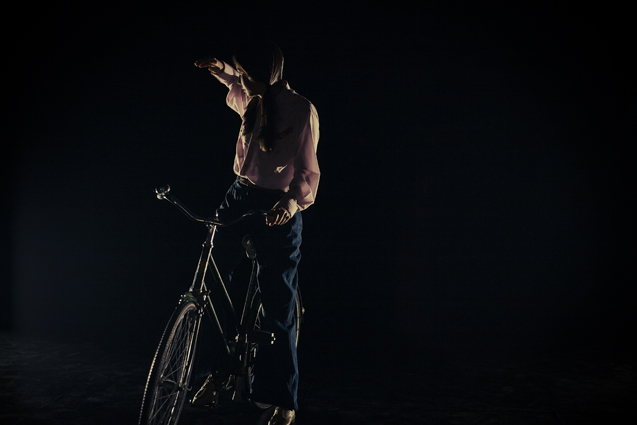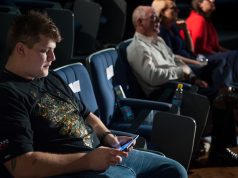
Andy Moro and I started working on In Spirit in 2007. The impetus sparked after seeing Andy’s work in dada kamera’s fond farewell at Buddies in Bad Times Theatre in TO. I had long been musing on a work about a girl who’d been abducted and murdered. I felt it was all I could do to contribute to a solution to these recurring tragedies. Once I saw Moro’s work, I felt the play I could conceive of was possible.
Child safety visits from police officers were not uncommon to schools in 1980s in Lethbridge Alberta. We learned about child abduction when the trend of wearing one’s name emblazoned in tidy black velveteen letters on the back of a t-shirt hit its peak. There had been cases where strangers approached a lone child and called them by name, which struck the fear of Satan into my little half-breed catholic heart. How could one evade an abductor without being rude to a real acquaintance of her parent? “Tara? I’m your mom’s friend from work. She asked me to come pick you up.”
We spent summers where my maternal roots are, the lower Nicola Valley in B.C. There I learned I already knew people who had first hand experience with having a child plucked from the universe. This place I regarded as idyllic and friendliest toward children – a cluster of Indian Reserves in the interior – was the crime scape for that greatest of horrors. I felt the world shift beneath my feet, and an obsession planted.
Years later, as a practicing theatre artist in Toronto, I reconnected with friends and family directly affected by the inexplicable loss of a child. Some had been living with loss for several years, and some had had it scorch them more recently. I had reached certitude around my own decision not to have children, and ended a marriage. I was keenly aware this kind of crossroads was one that some parents only ever wished for, for their children. Surviving heartbreak was a privilege, for it meant I was alive. After several long conversations with a number of people, (whose identities I will keep close out of respect for their right to move forth in life, rather than in grief) I received what permissions were possible to attempt a fictionalized account of one girl’s experience at the end of a foreshortened life.
While writing, I was roomies with one of my favorite actors and regular muse, Michaela Washburn. It was she who brought me to see Moro’s work. There was a confluence of inspiration that night, and shortly thereafter I penned a first draft, with the knowledge of Washburn’s considerable gifts allowing the voice of the character to come through to the page. Within days, Moro, Washburn and I were in studio, working the script. We worked like a team of sculptors, shaping the piece together, plying our individual strengths and insights. Our first invited audience came to see our work-in-progress a few days later.
The response that day, in 2007, was extremely mixed, with the most alarming remarks at the time even more surprising today. The tiny inaugural audience consisted of Indigenous theatre students, arts worker colleagues and former schoolmates of mine from Red Deer College. The room felt safe. All present spoke relatively frankly considering how often I see the death of an early play by politeness. Three of a dozen people genuinely had the curiosity about who would care to hear the story of an Indigenous girl gone missing. These people were being honest, not cruel, and yes, they were all Caucasian. It was an important thing to hear, though the expression of it silenced the young Indigenous woman present whose best friend had gone missing while they were still in junior high.
The awareness around what is now a hashtag – #MMIWG – has increased exponentially in the general population. Every major party in Canada has stated its stance on the issue – an issue that is never just an “issue” for the families who have lost their beloved. Mulcair has promised an inquiry within 100 days of an NDP victory, while Harper maintains his belief in the futility of such a thing. Adding to the offense is the messaging the RCMP, on Harper’s watch, has resolved to propagate in the media.
“70 per cent of murdered aboriginal women killed by indigenous men: RCMP” declared a Globe and Mail headline of April 2015. Similar headlines blazed up on the CBC and in the National Post. More than demonstrating the danger in the reductive nature of statistics, it revealed the bare-naked values of a country that has systemically tried to eliminate Indigenous people since its inception.
While Stats Can doesn’t collect data about homicides by race, our nearest neighbors do. According to a 2012 report cited in The Economist, in America “less than 20% of murder victims are killed by someone of another race.” One can deduce that more than 80% of murder victims are killed by someone of the same race. Why does Canada not collect crime stats based on race? The old “we’re too polite” notion obviously doesn’t fly among most Indigenous people. Had we access to similar information, the headline might read “Aboriginal people 20% less likely to be killed by their own as compared to the general population.”
The commonly cited number of #MMIWG today bobs around 1,200 after a 2012 RCMP report more than doubled the long-held 500. This number accounts only for women and girls missing and/or murdered since 1980.
The conversation around missing and murdered Indigenous women and girls has changed a lot since In Spirit began its journey in 2007. At the time, few plays offered a human telling of these stories, though they were profoundly influential. Marie Clements’ Unnatural and Accidental Women had blown the walls off my artist brain when Native Earth staged it at Buddies in 2004. Following this, I read and then saw Yvette Nolan’s Annie Mae’s Movement. In recent years we have ever more works on the subject from Keith Barker (play The Hours That Remain), Sarain Carson-Fox (dance The Missing), IsKwé (song Nobody Knows) and the artists’ collective that headed the exhibit Walking With our Sisters, to name a few. This lends hope while doing its part to point to the ubiquity of the problem.
Last year, through Native Earth, In Spirit played at Full Circle’s Talking Stick Festival in Vancouver where, by the grace of Creator, a group of twenty people (who identified themselves) with direct connection to the missing and murdered attended a performance. Our team was embraced by these mighty people, and blessed in our work. Since this time, ARTICLE 11 has enjoyed full creative control of the work, and – finally fully housed in an Indigenous values system – the piece is more powerful than ever.
_________________________________
In Spirit plays August 5 & 6, 8pm at Harbourfront Studio Theatre and August 8 at 10pm, under the Gardiner in the Fort York south parking lot. All shows are free and followed by an audience/artist conversation.
About the Author: Tara Beagan is Ntlaka’pamux and Irish “Canadian.” She humbly asks that you take five minutes to look up the missing and murdered Indigenous women and girls and learn the story of one person. Learn her name and speak it. We change the system that kills when we know each other’s stories.









